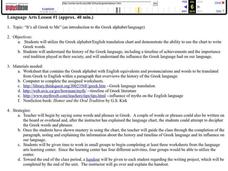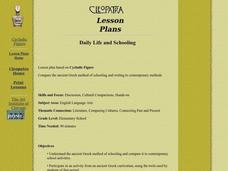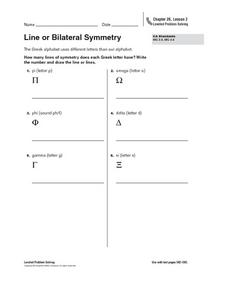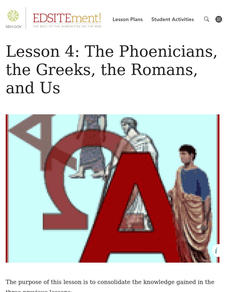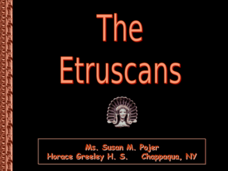National Endowment for the Humanities
The Greek Alphabet: More Familiar Than You Think!
In this Greek alphabet lesson plan, pupils explore the Phoenician origins to the Greek alphabet. Learners compare Greek letters to current letters and write a paragraph about the life of students in ancient Greece. They also identify...
Curated OER
It's All Greek to Me
Introduce your class to the Greek alphabet and language. Examine how the Greek language influenced the English language. Study the history, timeline of achievements, and the role oral history played in Greece.
Curated OER
The Greek Alphabet
Tenth graders examine the history and origins of the Greek alphabet. They take notes while listening to a teacher-led lecture, and read and interpret common Greek words on the board. Students then create a decorated name plate with...
Curated OER
Daily Life and Schooling
Students compare the ancient Greek method of schooling and writing to contemporary methods and learn the Greek alphabet on wax tablets.
Curated OER
Line or Bilateral Symmetry
In this problem solving worksheet, 4th graders figure out how many lines of symmetry 6 Greek alphabet letters have. Students write each number and draw the line or lines on the lines provided.
Curated OER
Chapter 12 Writing: the ABCs of Language
Providing a thorough presentation on the art of written language (and not just English), this slideshow will open your students' eyes to the sociological and linguistic issues surrounding writing systems, both modern and historical. The...
National Endowment for the Humanities
Lesson 4: The Phoenicians, the Greeks, the Romans, and Us
Learners review knowledge gained in the three-part unit on the history of the alphabet. Using maps and images, learners consolidate their understanding of ancient Greece, the Romans and the Phoenicians, and their respective impacts on...
Curated OER
The Alphabet is Historic: The Roman Alphabet is our Alphabet
Young scholars show that the Greeks, Phoenicians and Romans lived in the Mediterranean area. They give reasons why the alphabet was important for the Romans. and say that the Romans developed the alphabet they are learning in school.
Curated OER
BINGO with Greek and Latin Roots: Unit 1 Narrative Writing
Play BINGO! Reinforce knowledge of word roots with an adaptation of this classic board game. The teacher draws a root word from a bag and learners fill in a square with a word that has the same root base. Instructions and Bingo cards are...
Curated OER
Prefixes Aplenty
Introduce several new prefixes to your vocabulary lesson. After alphabetizing 19 prefixes, including pro-, geo-, and thermo, third graders use a dictionary to find one word that begins with each prefix. Extend the activity by having kids...
Curated OER
The Alphabet is Historic
Students describe how the Phoenicians, Greeks and Romans passed down the alphabet through the generations. They compare and contrast the letters from early alphabets to the one of today and discuss how they are different. Using a map,...
Curated OER
The Great Alphabet Challenge
In this writing sentences activity worksheet, student practice their language skills as they craft groups of sentences in which first letter of each word starts with successive letters of the alphabet. Three examples are provided.
Curated OER
Now You're Speaking My Language; Deciphering the Symbols of Early Civilizations
Learners explore early attempts at written language. In this early civilizations lesson, students investigate first attempts at written communication. Among the civilizations covered are Mayan, Greek, and Egyptian.
Curated OER
The alphabet
Students write words that the teacher spells out orally. In this alphabet lesson plan, the teacher signs the words to music and the students write them down.
Curated OER
Ancient Refuge in the Holy Land - International Phonetic Alphabet
High schoolers research the uses and symbols of the International Phonetic Alphabet. They complete a worksheet to translate and transcribe phrases of English into the International Phonetic Alphabet.
Curated OER
The Etruscans
The Etruscans were a mighty civilization that living in what is now known as Tuscany. Discover their politics, military, writing system, and rulers of Rome through a visual presentation. The work is already done, all you need to do is...
Curated OER
The Glory That Was Greece: A Test
Did your class just finish a unit on Greek life, culture, and conquest? If you think they know everything there is to know about Ancient Greece, then put them to the test with this exam, which contains thirty multiple choice questions.
Curated OER
Primary History: Ancient Greeks - Growing Up in Greece
In this ancient Greek activity, students examine growing up in Greece. They examine why unwanted babies were sometimes abandoned, list differences between Greek schools and schools today, practice writing with Greek characters, and read...
Newspaper in Education
The Iliad: A Young Reader Adventure
Is The Iliad part of your curriculum? Check out a resource that offers something for those new to teaching the classic and those with lots of experience using Homer's epic. Plot summaries, discussion questions, activities abound in this...
Curated OER
Hieroglyphics: It's Not Greek To Me! (It's Egyptian)
Students identify different hieroglyphic characters. They spell their name and write a sentence using them. They use online hieroglyphic translators as well.
Curated OER
The History of Writing
The history of written communication can be an interesting addition to history lessons.
Curated OER
Science Hits Activity
Students listen to a song that teaches the elements of the periodic table and write their own song to be used as an aid in remembering scientific information.
Curated OER
Friday the 13th
In this algebra worksheet, students rewrite words into algebra and algebra in to words. They write out Roman Numeral and scientific notations. There are 13 questions with an answer key.
Curated OER
Pi Day
In this Pi Day worksheet, students complete activities such as reading a passage, phrase matching, fill in the blanks, correct words, multiple choice, spelling sequencing, scrambled sentences, asking questions, take a survey, and...



